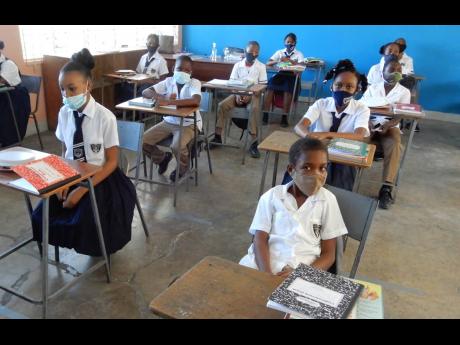FACE-TO-FACE NEW YEAR CRISIS - COVID surge could doom expanded in-person classes January
The threat of a major spike in coronavirus cases after the Christmas festivities may doom hopes for a broader resumption of face-to-face classes in the New Year, potentially wasting the Government’s pilot in 17 public schools that was positioned as a dress rehearsal for greater engagement.
That alarm has been raised as educators grappling with the dislocation caused by the shuttering of schools in March days after the virus was first detected in Jamaica. They have blamed online classes for marginalising students who are poor or resident in remote districts and reducing learning outcomes.
Jamaica’s Chief Medical Officer Jacquiline Bisasor McKenzie’s warning last Thursday of a new wave of infections clashes with backroom activism from business lobbyists who are pressing the Holness administration to relax coronavirus restrictions such as a national curfew that runs from 9 p.m. to 5 a.m.
The fiscal argument centres on the 135,000 jobs lost because of COVID-19 containment measures that have stifled commerce, with the economy projected to shrink by 11.3 per cent in the third quarter.
But teachers and principals are forecasting that Christmas’ economic gain could cause more pain in January for the education sector.
Tracey-Ann Holloway-Richards, principal of Maxfield Park Primary School in Kingston, has appealed for the Government not to relax measures for Christmas.
“The curfew as it is should stay, and if possible, bring it to an earlier time. Otherwise, the cases are going to increase, and many Jamaicans are not disciplined enough, and that is why we have been so severely affected,” Holloway-Richards told The Gleaner.
Her word of caution came hours after Jamaica recorded 44 new COVID-19 cases, increasing the tally to 10,284 as at Saturday, November 21. Of the total cases, 4,398 are active, with 80 people hospitalised, 11 of them critically ill.
There have been 238 deaths.
While the mortality rate among coronavirus-infected children is low, and they are often asymptomatic, healthcare professionals harbour concerns that they could be vectors of the virus, trasmitting it to grandparents and other elderly guardians.
Holloway-Richards said that a rise in cases will erode public buy-in that is key to the resumption of in-person interaction.
“Teachers, parents, students, and principals have been overwhelmed with the online classes. Majority of the inner-city schools and schools in the country areas have not been able to fully access classes, and if this continues, it will impact the education sector severely, and the children are going to get left behind,” Holloway-Richards lamented.
The principal’s school has a population of 503 students, but up to last Friday, only 219 were being reached online.
Face-to-face classes resumed under a two-week pilot for 17 schools on November 10 among more than 70 deemed to be low risk on a vulnerability index assessing demographic data and geoinformatics.
In Parliament last Tuesday, Education Minister Fayval Williams reported that attendance at the high schools during the first week was approximately 52 per cent of the grade 11 cohort, while attendance was low at the primary schools.
Educator at Mona Heights Primary School, Fabion Mahabeer, said the soundings from the health officials paint a grim picture about the future of face-to-face classes.
“It’s basically a wait-and-see given the variables we have to work with,” he said.
Mahabeer told The Gleaner that students are adapting “relatively OK” to online classes, but there are some who are still challenged by the lack of devices and spotty Internet connectivity.
It is the on-again, off-again hand-wringing that has made the transition to face-to-face classes inconclusive - locally and globally.
In-person sessions have been delayed because of loud resistance from parents and principals, but that resistance faded as online fatigue set in. But any major uptick in infections can quickly shift the balance, as made clear last Thursday when the United States largest school district, New York, sent home 1.1 million students as America faces 200,000 new cases a day. Infections there have topped 12 million and deaths around 250,000.
Back in Jamaica, principal of Port Royal Primary, Nicola Jones, said that her school would be affected if there were to be a spike in the eastern Kingston community and more generally islandwide.
“Online learning would be cut off for a bit because children are going to each other’s homes to use the Internet. The different facilities that the community offers are used by all the children in the community because it’s not a big town. It would be unfortunate for us on both ends - online and face to face - because quarantining would have to take place,” she said.
Jones said she has written to the education ministry requesting permission to hold face-to-face classes as all but two students reside in the area and are children of teachers.
Meanwhile, for acting principal of Allman Town Primary School, Latoya Nesbitt, learning losses among grade one and two students may be further exacerbated if face-to-face classes are not resumed at the earliest possible time.
“There have not been many cases among children at the primary level, but if there is a hike, the homes from which the children are coming will be affected and, in turn, the reopening of school,” she explained.
She shared that online classes have resulted in greater involvement of parents in the education of the children, and the school is now on a drive to get some parents enrolled in literacy classes through the Jamaica Foundation for Lifelong Learning under HEART Trust/NSTA.

